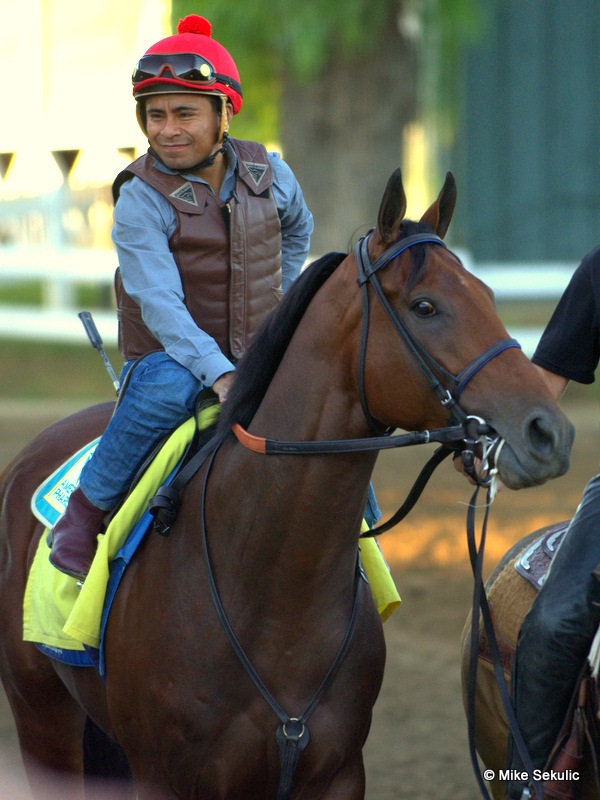The Road To The Breeders Cup Races
 The Road to the Breeders Cup Races
The Road to the Breeders Cup RacesHow Horses Qualify for Racing’s Biggest Stage.
The Breeders' Cup is one of the most prestigious events in the world of horse racing. It draws the best horses, trainers, jockeys, and owners from across the globe to compete in a two-day championship event which features a total of 14 races.
Since its inception in 1984, the Breeders' Cup has become a pinnacle of excellence in horse racing, showcasing the best of the sport and each race is limited to a maximium of 14 runners.
Held at different tracks each year, it serves as the grand finale of the racing season, offering significant purses and international recognition to its winners. The 2024 renewal of the festival will take place at Del Mar Racecourse.
Let’s delve into how horses qualify for the Breeders' Cup, the significance of the Breeders' Cup Challenge Series, and the various paths horses take to earn a coveted spot on racing's biggest stage.
 Horse Racing at Del Mar
Horse Racing at Del MarBreeders' Cup Challenge Series: "Win and You're In"
The most direct route to the Breeders' Cup is through the Breeders' Cup Challenge Series, also referred to as "Win and You're In" races.
This global series comprises more than 80 races across multiple countries and continents. Horses that win designated challenge races earn an automatic spot in the corresponding Breeders' Cup race.
These races are designed to ensure that the best horses from around the world have the opportunity to compete. They are in significant racing jurisdictions, including North America, Europe, South America, Asia, and Australia. Each challenge race corresponds to one of the 14 Breeders' Cup divisions.
For example, winning a critical turf race in Europe may secure a horse's entry into the Breeders' Cup Turf, while a victory in a dirt sprint in North America could land a spot in the Breeders' Cup Sprint.
Additionally, horses that win these "Win and You're In" races also have some of their entry fees and travel expenses covered by the Breeders' Cup, further incentivising participation in these qualifying events.
This system not only makes the road to the Breeders' Cup more accessible but also ensures that top horses from around the world have an easier path to the event.
Accumulating Points and Ranking Systems
While the "Win and You're In" races offer a direct route to the Breeders' Cup, not every horse can win in one of these challenge events. For those that don’t win, another critical path to the Breeders' Cup involves accumulating points throughout the season based on performance in graded stakes races.
The Breeders' Cup maintains a ranking system where horses earn points by finishing in the top positions in these primary races.
The points system rewards consistency throughout the year, ensuring that horses who perform well at the highest levels are considered for Breeders' Cup entry.
For example, a horse that consistently finishes in the top three in prestigious races will earn enough points to be considered for one of the Breeders' Cup races. This system levels the playing field for horses that may not have won a "Win and You're In" race but have proven their quality and ability to compete at the highest level.
At the end of the season, if more horses are entered for a particular Breeders' Cup race than spots available, the Breeders' Cup Committee uses the points standings to determine which horses will make the field.
Horses with the highest point totals are given preference, ensuring that only the best and most consistent horses qualify for racing’s biggest stage.
 Breeders Cup Winner American Pharoah
Breeders Cup Winner American PharoahSupplemental Entries and Wild Cards
While most horses qualify for the Breeders' Cup through either the "Win and You're In" races or by accumulating points, there is still a way for unqualified horses to gain entry—through supplemental nominations.
Owners can pay a supplemental fee to enter their horses into a Breeders' Cup race, even if they haven't won a challenge race or accumulated enough points.
This option is typically used for horses that peak late in the season or for those who may have been sidelined due to injury earlier in the year. Although the supplemental fees are high, the significant purses offered at the Breeders' Cup often justify the cost.
These supplemental entries have performed exceptionally well in some cases, proving that the door to success at the Breeders' Cup remains open to all quality horses.
Additionally, the Breeders' Cup may offer "wild card" entries for horses that do not meet the traditional qualifications but are deemed exceptional based on other factors.
These wild cards are rare but can provide an additional layer of excitement to the event by ensuring that the best horses can compete. Not to mention that these wild cards are also well-loved by horse racing bettors, especially the upcoming 2024 Breeders’ Cup, where some of the wild cards are popular in 2024 Breeders' Cup betting like Seize the Grey.
The Road To The Breeders Cup Races Final Words
The road to the Breeders Cup races is paved with challenges, points systems, and strategic planning by horse owners and trainers.
The "Win and You're In" system offers a direct route for the best horses to qualify, while the points system rewards consistency across the racing season.
While Supplemental nominations and wild card entries ensure that even late bloomers and exceptional horses have a shot at competing.

You Might Like These
Kentucky Derby Odds: Will there be a hometown favorite?
Preakness Stakes Odds: Will the champions face fresh challengers?
Belmont Stakes Odds: At 1½ miles, stamina becomes the great equalizer as longshots can threaten.
Breeders' Cup Odds: International talent collides with American speed, reshuffling expectations across the board.
Dubai World Cup Odds: Under desert lights, can a Japanese sensation prevail against the world's elite.
Pegasus Cup Odds: Retirement beckons for champions seeking one final payday at America's richest race.
Bet on Horses: Every wager tells a story of hope against mathematical probability.
Kentucky Derby Betting: Beneath fancy hats and mint juleps, fortunes change hands with each thundering hoof.
Preakness Stakes Betting: The middle jewel rewards those who recognize when Derby form holds true.
Belmont Stakes Betting: Distance separates champions from pretenders when the final furlong tests them all.
Breeders Cup Betting: Global racing converges for two days where value hides in plain sight.

Returns Policy: Once a customer has agreed to pay for a product or service no returns will be permitted or payments returned.
All PayPal transactions are subject to the PayPal Privacy Policy
Privacy Policy: Personal details provided to this site by an individual may be shared with third parties unless requested otherwise.
Above policies updated 15 March 2018




